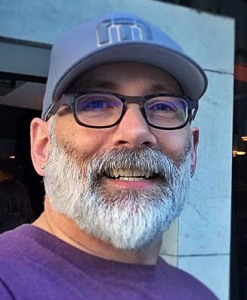Authors: Sarah Yada Seto, Dominik Zbogar | Published: 30 November 2021
Insights and Experiences of an Occupational Therapist
We spoke to John Cobb, Occupational Therapist (OT) in the Acute Spine Unit at Vancouver General Hospital. John has been an OT for 28 years and provides his advice and insights on his role, and how work in this field has evolved over the years.
Can you describe your role as a healthcare provider?
 I work in acute care, so I primarily look after people with new injuries – they tend to be traumatic injuries from car accidents, falls, and sports. We also admit patients with spinal cord injury (SCI) from cancer as well as infections. The length of stay for patients varies from about 3 weeks and, in rare cases, up to a year. It’s about taking care of people and doing much more than just applying your knowledge and skills. People with SCI are in a tough spot, and don’t know what to do next. You need to connect with the person, help them be empowered and regain control of their life.
I work in acute care, so I primarily look after people with new injuries – they tend to be traumatic injuries from car accidents, falls, and sports. We also admit patients with spinal cord injury (SCI) from cancer as well as infections. The length of stay for patients varies from about 3 weeks and, in rare cases, up to a year. It’s about taking care of people and doing much more than just applying your knowledge and skills. People with SCI are in a tough spot, and don’t know what to do next. You need to connect with the person, help them be empowered and regain control of their life.
What changes have you seen in rehab, treatment and outcomes for people with SCI over time? How has your rehab practice changed over time?
There has been a big shift to evidence-based practice and standardization. Nowadays, the work is based on both clinical experience and knowledge, but also by integrating research outcomes and taking things from ‘bench to bedside’. In terms of those first hours and days, and how people are diagnosed … all of that has improved. The surgical management they receive has also improved. With continued revisions to the International Standards for Neurological Classification of Spinal Cord Injury (ISNCSCI) – the diagnosis tool we use – more and more patients are being diagnosed as incomplete. It’s interesting. It may be that more incomplete injuries occur these days, but the increase could be the result of being more accurately diagnosed. The diagnosis sets the trajectory of care. We can now say to people – an incomplete injury is more ‘open’ in terms of the possibility for improvements. There are now different expectations and different hopes.
What are some of the greatest challenges you have seen in your field?
One of the biggest challenges relates to the complexity of the injury. On a medical and physical level it’s managed pretty well in the acute and rehabilitation phases of care. With some long-term issues like spasticity and pain, a lot of work has been done but I still think that the spinal cord injury community would say its not good enough yet. They would say, “If I have to live with a SCI, could I at least be pain free?” There’s a certain kind of complexity, acuity, and dependency that are thrust upon these individuals in the beginning, and then there is the ‘push and pull’ of the system that is trying to meet those needs. Challenges related to having the time, equipment, space, technology that you need to do your best job arise. It’s not all bad… but I do feel that people are discharged out of the formal health care system quickly.
What inspires you most about your role?
First, it’s the staff who are willing to go the extra mile and do whatever they need to do. They give their patients every chance to succeed. Second, it’s the people who are newly living with SCI and have every reason to give up, and complain, and be mad… but they just find a new and unique way to dig deep, face the challenge, and have a good life!
How has technology in rehab advanced over time?
Innovative technology is constantly being created and developed. Matching the right tech with the right person is key. I hope the next big step will be to make all these innovations universally available – quickly, easily, and affordably. If a piece of technology is awesome but a person cannot have it, it does them no good. Apple products tend to be disability friendly and starting with that can simply mean, “Hey, let’s turn on your voice control so you can control your iPhone or iPad.” SCI is so complex though – you can have tech like voice control to access your iPhone, but it doesn’t mean you are completely physically independent. In acute care – if you don’t have somebody to set you up but you need it, then it doesn’t even matter if the tech is in the room… Sometimes it feels like the system does not want to deal with that level of detail, but living with SCI is in the details.
What are some of the best resources you recommend for people with SCI?
For those who are in acute care and rehab, I think one of the best resources is the knowledgeable staff; there are many professionals who are deeply dedicated to this unique population. Also, there are lots of community-based organizations that are there to provide ongoing support including SCI-BC and SCIRE Community. Once the patient returns to the community – it’s invaluable to connect with other people with SCI who have lived it and know it. It’s really big. My hope that is that everybody that goes into the community will connect with someone.
What keeps you sane?
Sometimes I like being by myself and getting in some quiet time, but usually I’m pretty active. Vancouver is great for staying active – and I have a close network of family and friends. I enjoy hiking, cross-country skiing, going out on the seawall, and going to restaurants when I can!
What advice do you have for those who will be entering your field?
This work is not easy but it’s important – and people will truly rely on you to be excellent and for that reason, it’s completely worth it.
![]()






